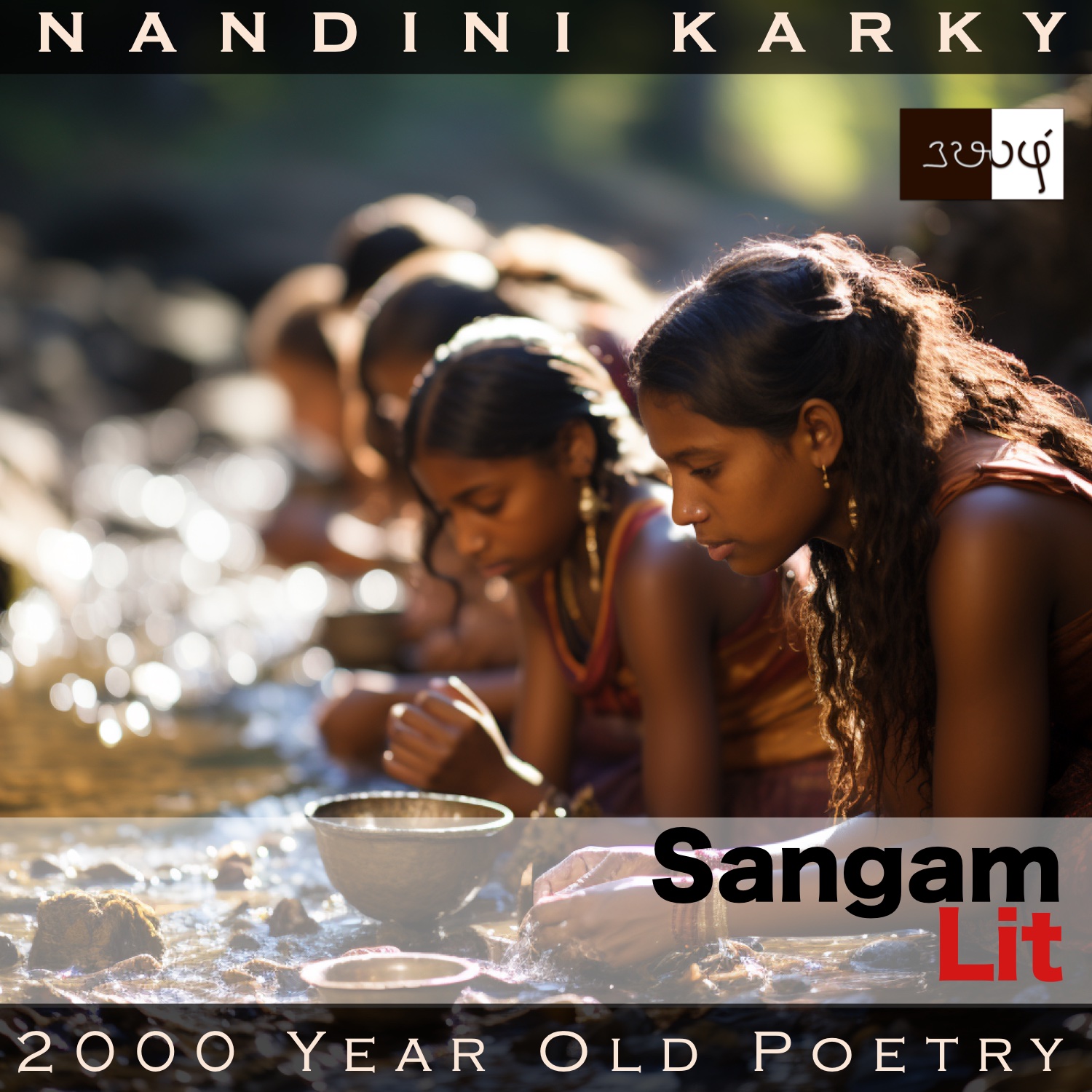Podcast: Play in new window | Download
Subscribe: Apple Podcasts | Spotify | Amazon Music | Android | iHeartRadio | TuneIn | RSS | More
In this episode, we perceive the joy felt in a king’s presence, as portrayed in Sangam Literary work, Puranaanooru 176, penned about the Velir King Nalliyakodan by the poet Purathinai Nannaakanaar. Set in the category of ‘Paadaan Thinai’ or ‘Praise’, the verse renders the natural prosperity of this king’s country.

ஓரை ஆயத்து ஒண் தொடி மகளிர்
கேழல் உழுத இருஞ் சேறு கிளைப்பின்,
யாமை ஈன்ற புலவு நாறு முட்டையைத்
தேன் நாறு ஆம்பல் கிழங்கொடு பெறூஉம்,
இழுமென ஒலிக்கும் புனல் அம் புதவின்,
பெரு மாவிலங்கைத் தலைவன், சீறியாழ்
இல்லோர் சொல் மலை நல்லியக்கோடனை
உடையை வாழி, எற் புணர்ந்த பாலே!
பாரி பறம்பின் பனிச் சுனைத் தெண் நீர்
ஓர் ஊர் உண்மையின் இகழ்ந்தோர் போல,
காணாது கழிந்த வைகல், காணா
வழி நாட்கு இரங்கும், என் நெஞ்சம் அவன்
கழி மென் சாயல் காண்தொறும் நினைந்தே.
A song filled with delightful elements found in nature. The poet’s words can be translated as follows:
“Young maiden wearing radiant bangles, when playing ‘orai’ in the dark mud ploughed by the male boar, dig up flesh-scented eggs of a tortoise as well as tubers of a honey-scented waterlily in the huge town of Maavilangai, resounding with echoes of streams dashing against sluices. The lord of this town is Nalliyakodan, the one praised with awe by those poor bards playing on small lutes. Because you have gained his grace, you will live, O fate that is one with me! Akin to those, who appreciate not the worth of the clear waters from the cool springs in Paari’s Parambu country, I have spent many days without seeing him. For those days then and for days to come when I might not see him, my heart feels sorrowful, whenever I glance at his gentle nature now!”
Let’s take a deeper look at the thoughts expressed here. As in a poem from the ‘Aham’ section of Sangam literature, the poet begins with a scene where young girls are engaged in the playful pursuit of an ancient game called ‘Orai’. The mud on which they are playing is said to be ploughed by a male boar. As we have seen in a previous Puranaanooru poem, these boars dig up the soil to search for tubers and this becomes the effortless ploughing for mountain farmers. Returning to this song, we see these girls discovering fresh turtle eggs smelling of flesh as well as tubers of the fragrant waterlily. All this happens in the town of Maavilangai and this scene goes to metaphorically depict the unexpected richness one would find in this place. To further illustrate the rich water resources herein, the poet points to the sound of river streams dashing against sluices of dams, a clear indication of water management in the ancient era. The poet then connects Maavilangai to the king being sung about, saying this is the town of King Nalliyakodan, famously celebrated by bards with small lutes.
Declaring that his fate will live on because he has happened to win the favour of this king, the poet then brings forth a picture perfect simile to talk about how people who live in Paari’s Paarambu country do not realise the worth of the sweetness and clarity of waters in the springs there. Like that, the poet feels that he too has underestimated the worth of this king. He concludes by saying that he’s also filled with worry about days he will not see this king even as he looks upon the kind nature of the king smiling upon him just then. In those words, we can sense both regret about the past and anxiety for the future in the poet’s words even in the midst of his joyous present! Most of all, the simile about King Paari’s cool waters etches the relatable truth about not realising the worth of something we have always had and in plenty. Perhaps the only thing we can do to avert that regret and anxiety this poet feels owing to this very attitude, is to cultivate a sense of gratitude for all those little things in our life, which we often take for granted!




Share your thoughts...